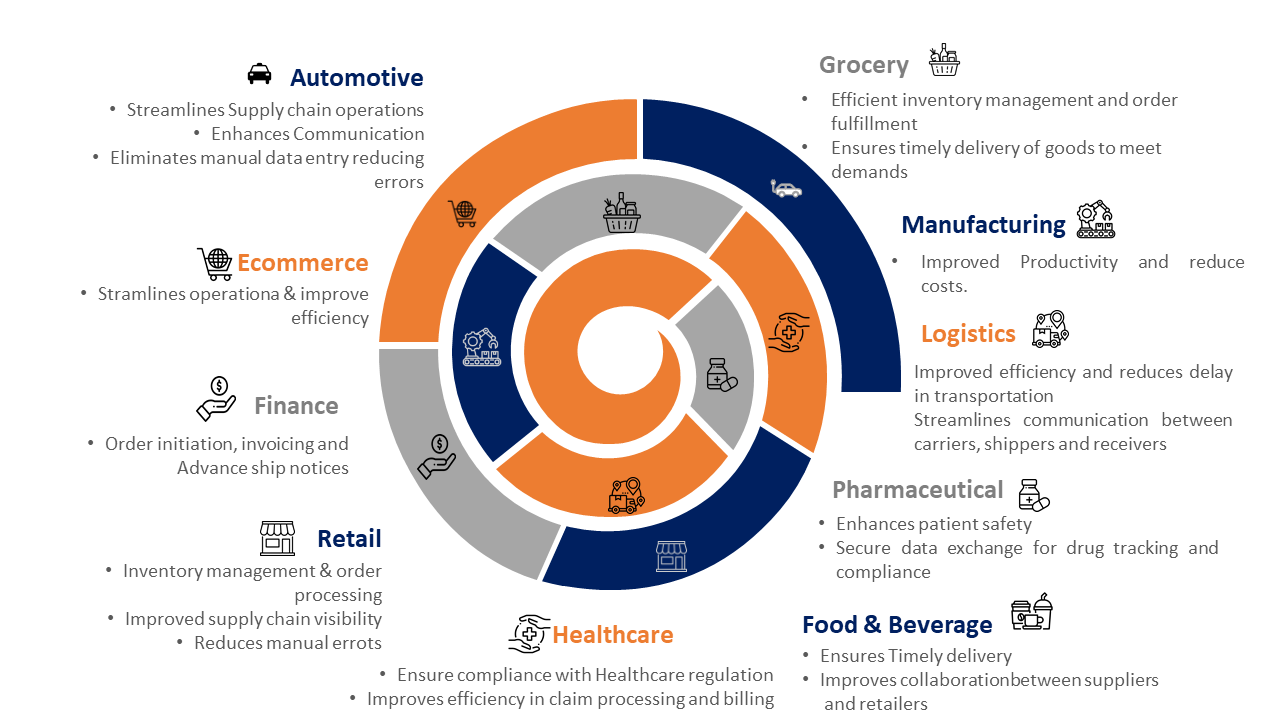EDI or Electronic data interchange is often misunderstood as a medium to exchange information between two distant & online exchange points. However, it is not a medium but a standard in which the knowledge transfer is claimed to stay safe and secured due to proper encryption.
Exploring it here in this blog in-depth to vanish such myths and confusions about EDI along with some more knowledgeable stuff related to electronic commerce, let us continue with the basics of EDI in very brief and then towards the main subject of this article that includes the top 10 industries to use EDI for their knowledge transfer

EDI in Automotive Industry
The automotive industry is a sector that relies heavily on the efficient management of its supply chain to ensure the timely delivery of goods and services. The industry has adopted Electronic Data Interchange (EDI) solutions to streamline its operations and enhance communication among its various stakeholders.
EDI solutions and services in the automotive industry allow manufacturers, suppliers, distributors, and retailers to exchange business documents electronically, including purchase orders, invoices, and shipment notices. It has eliminated the need for manual data entry, reducing errors and processing times while improving supply chain visibility and collaboration.
Regulations
Moreover, Modern EDI Solutions have enabled the automotive industry to comply with various industry-specific regulations and standards, such as the Automotive Industry Action Group (AIAG) standards, which require standardized EDI transactions. The R&D department is the most demanding one for the same, along with the necessity of keeping the data safe from getting stolen.
The Automotive industry has a handful of dimensions to research in and compete with the market.
The dimensions of research and knowledge exchange include-
- Aerodynamics of a vehicle
- Engine advancement
- Fuel optimization/utilization
- Metallurgical advancements, and many more.
These are the dimensions that take any automotive business ahead of its competitors and for that, the EDI service providers become an equivalent necessity. The newer inventions and implementations are to be circulated all the production and development areas spread across the globe.
Finance Industry and Electronic Data Interchange
Finance does not involve only the accounts or the payroll services as a whole but everything that is around monetary transactions can be asserted as a part of finance.
Be it then the transfer of benefits in the form of certificates and not the bills or currency notes. Insurance benefits too are sometimes required to be cross-verified via the internet and are very much prone to get manipulated in between an exchange.
Thus, the knowledge transfer before making bigger financial transactions or even the smaller ones requires some cross-verification of invoices.
EDI transactions in finance are of different types including the one as the order to initiate the transaction, the other as the invoice that proves that the transaction has been made, and the other as an advance ship notice to virtually receive an order until it physically arrives next to your doorstep.
Similarly, EDI 834 is used for the benefits enrollment and maintenance must abide by some regulatory act constructed by the federal government of the USA.
EDI In The E-commerce Industry
The E-commerce industry has been growing exponentially over the past few years, showing no signs of slowing down. With the advent of technology, E-commerce companies have streamlined their operations and provided better services to their customers. One of the technologies that have played a vital role in this transformation is Electronic Data Interchange (EDI).
EDI solution providers have allowed E-commerce companies to automate their business processes, thereby reducing errors, improving accuracy, and increasing efficiency. With EDI services, companies can exchange business documents such as purchase orders, invoices, and shipping notices electronically, eliminating the need for manual data entry and reducing the risk of human error.
Need for EDI in E- commerce
EDI in industries has become an essential tool for E-commerce businesses, enabling them to keep up with the growing demands of the industry. For instance, EDI has enabled online retailers to receive orders from their customers, process them, and send them to their suppliers within minutes. It has reduced the time it takes for products to reach customers, improving their overall shopping experience.
In addition to the benefits mentioned above, EDI solutions have helped E-commerce companies significantly reduce their operating costs. By automating their processes, these companies have eliminated the need for manual labour, reducing their labour costs significantly.
Commercial trades and exchange of goods produce the most number of orders and invoices in count per day. An E-commerce on the same end has doubled or even tripled the number of trades to happen with its digital capabilities.
If you run an eCommerce business, make sure to get your eCommerce solution developed from an enterprise software development company that could embed or integrate EDI with it to ensure data safety along with the transactions.
However, we have some frameworks that support EDI services but it is up to the demand and the needs of a business to meet, and the choice to get the eCommerce solution developed is over them.
Retail Industry and EDI
Retail is one of the biggest sectors that involves the most number of recipients than any other industry. It includes multiple industries within itself as every sector has retail customers and vendors that behave either as a consumer or a supplier respectively.
Once the product is supplied to the vendors, it means the product is now ready to step-in into the market, and thus, communication and proper interaction with the suppliers becomes necessary for the smoother supply chain management.
EDI can benefit Supply chain management and ease the entire retail industry by allowing the suppliers to communicate and interchange the information easily with keeping the data enrolled in it safe within the transactions.
EDI in the Healthcare industry
In today’s fast-paced business world, Electronic Data Interchange (EDI) solutions have become an indispensable tool for companies in various industries. Among these, the healthcare industry stands out as one of the most significant beneficiaries of EDI services. Healthcare organizations have embraced EDI in a big way to streamline their processes, increase efficiency, and improve patient care. This blog section will discuss how the healthcare industry is leveraging EDI solutions and services to its best advantage.
One of the most significant advantages of EDI in the healthcare industry is that it allows healthcare providers to exchange critical patient information electronically. It includes patient demographics, insurance information, medical records, and other relevant data. EDI in healthcare eliminates the need for paper-based documentation and manual data entry, which can be error-prone and time-consuming. EDI Solutions ensure that patient information is accurately and securely transmitted between healthcare providers, reducing the risk of errors and ensuring continuity of care.
With EDI, healthcare providers can exchange real-time information, enabling faster diagnoses, treatment plans, and interventions. It can be especially critical in emergencies where timely access to patient information can mean the difference between life and death.
Benefits of EDI in Healthcare
Managed EDI services have helped healthcare organizations to streamline their operations, improve their supply chain management, and reduce costs. Healthcare providers can focus more on patient care and clinical services by automating administrative tasks such as order processing and invoicing. EDI solutions also allow healthcare providers to track their inventory levels in real time, reducing the risk of stock-outs or overstocking, which can lead to waste and increased costs.
EDI in the healthcare industry has also played a significant role in improving patient outcomes. With EDI solutions, healthcare providers can quickly access patient information, including medical histories, allergies, and medications, allowing for better-informed treatment decisions. Additionally, EDI services have enabled healthcare providers to share information with patients more efficiently, increasing patient engagement and satisfaction.
EDI services in the Healthcare industry are typically the most common usage of electronic data interchange as the insurance sector and healthcare benefits are the most information-demanding sectors for their claims followed by successive document verifications.
There exist some hcm solutions like AccomplishEP that support EDI services within itself and can accommodate a business if it has to take care of employee benefits and administration overall.
Are you searching for a EDI service Provider?
Well, your search ends here. Contact our team of EDI experts and get assistance
Grocery Industry
The grocery industry has come a long way in recent years. How consumers shop for groceries has evolved, and so have the processes used by grocery stores. One of the most significant changes has been the implementation of EDI solutions. EDI services are revolutionizing the grocery industry by streamlining processes, reducing costs, and improving efficiency.
EDI is a computer-to-computer exchange of business documents between companies. In the grocery industry, EDI is used for ordering, invoicing, and shipping processes. EDI allows for the automatic exchange of information between grocery stores and their suppliers, eliminating the need for paper-based documents and reducing manual data entry.
The use of EDI solutions in the grocery industry has allowed for better collaboration between suppliers and retailers. With EDI, suppliers can get real-time information on inventory levels and sales data, allowing them to plan their production and supply chain better. It not only saves time and reduces costs, but it also ensures that the right products are available at the right time.
In addition to better collaboration, EDI services in the grocery industry have increased accuracy and efficiency. By automating processes, EDI eliminates the errors commonly associated with manual data entry. It reduces the need for manual intervention, which frees employees to focus on other tasks.
Advantages of EDI in Grocery Management
One of the most significant advantages of EDI in the grocery industry is that it allows for better inventory management. With real-time information on inventory levels, retailers can better manage their stock, reducing waste and overstocking. It not only reduces costs but also helps to ensure that products are available when customers need them.
Consumers are switching now from physical money exchange to online or digital mode. Thus, it becomes necessary to keep a track of every single transaction as the grocery industry has almost the entire world as its consumer. If one can steal the data from the system which is not secure enough, that could be a huge loss of an enormous database. Thus, EDI as a safety standard is a vital necessity when it comes to online transactions.
Overall, EDI Solutions have transformed the grocery industry by streamlining processes, reducing costs, and improving efficiency. Implementing EDI services has allowed grocery stores to collaborate better with their suppliers, increase accuracy, and better manage their inventory. As technology continues to evolve, we can expect to see even more advancements in how EDI is used in the grocery industry.
Electronic Data Interchange (EDI) in Manufacturing industry
The manufacturing industry is one of the largest sectors in the world economy, and it plays a crucial role in the supply chain of various industries. EDI services have become an essential tool for manufacturers to streamline operations, enhance collaboration with suppliers, and optimize supply chain management. With EDI in manufacturing, businesses can automate their document exchange processes, reducing errors and increasing their productivity.
Manufacturers use EDI Solutions to exchange different types of documents, such as purchase orders, invoices, shipping notices, and payment confirmations, among others. By automating these processes, manufacturers can eliminate manual data entry and reduce the time and costs of traditional paper-based processes. EDI also helps manufacturers reduce errors and discrepancies in data entry, improving supply chain management accuracy.
Advantages of EDI In Manufacturing
- Using EDI in manufacturing can also increase its visibility in the supply chain. Manufacturers can track the movement of goods from their suppliers to their warehouses and customers in real-time. This real-time visibility allows them to respond quickly to any issues in the supply chain. It would include delayed shipments or product quality issues.
- EDI services also enable manufacturers to collaborate more effectively with their suppliers. By using EDI, manufacturers can share real-time data with their suppliers, such as inventory levels, production schedules, and order status. This collaboration helps both parties to plan more effectively and optimize their production and supply chain operations.
Government sector
The Government sector is one of the industries significantly benefiting from Electronic Data Interchange (EDI) solutions and services. Getting started with EDI in this sector has brought about significant improvements in communication and data management. EDI has been used in the government sector for various purposes, including procurement, invoicing, and payment processing. By automating these processes, the government can efficiently manage its finances and minimize errors during manual data entry.
One of the main benefits of using EDI in the government sector is cost savings. With EDI Solutions, the government can eliminate paper-based processes, which can be time-consuming and costly. Additionally, EDI eliminates the need for manual data entry, significantly reducing the risk of errors. Another advantage of EDI in the government sector is accuracy and efficiency. By automating processes, EDI reduces the risk of errors, which can be costly and time-consuming.
In addition to cost savings and improved accuracy, EDI in the government sector also promotes transparency and accountability. By providing real-time data, EDI ensures that all parties involved in a transaction have access to the same information. It promotes transparency, essential for ensuring that government agencies are accountable for their actions.
EDI in Energy industry
The energy industry is a vital sector that powers our daily lives. From electricity production to the exploration and extraction of oil and gas, the energy industry is constantly evolving to meet the growing energy demand. The industry has adopted EDI Solutions to streamline its operations and enhance its supply chain management to stay competitive and efficient.
EDI services have become integral to the energy industry, enabling organizations to automate their business processes and exchange data electronically. By implementing EDI in industries like energy, companies can improve their communication and collaboration with suppliers, customers, and partners, resulting in enhanced efficiency, reduced costs, and increased productivity.
One of the key benefits of using EDI Solutions in the energy industry is the ability to improve supply chain management. With the help of EDI services, energy companies can automate their procurement processes, enabling them to receive and process purchase orders, invoices, and shipping documents electronically. It allows for quicker processing times and reduces the risk of errors and delays caused by manual data entry.
The use of EDI in the energy industry can also improve data accuracy. With EDI Solutions, data is entered only once and is automatically transmitted to all necessary parties. It eliminates the need for manual data entry, which can lead to errors and inconsistencies. With improved data accuracy, companies can make more informed decisions, improve customer service, and reduce costs associated with resolving data errors.
EDI Solutions also provide real-time visibility into supply chain operations, enabling energy companies to track shipments, monitor inventory levels, and receive alerts for any issues that may arise. It helps organizations identify and resolve potential problems before they become significant, minimizing their impact on operations and customer service.
Food and Beverage industry
The food and beverage industry is one of the most critical sectors in the global economy. It covers various products, including packaged food, beverages, and fresh produce. As consumer demand continues to increase, efficient supply chain management becomes more critical. That’s where EDI Solutions come in, providing an automated way of exchanging information between trading partners in the industry.
EDI (Electronic Data Interchange) is a technology that has existed for several decades. It allows businesses to exchange documents electronically in a standardized format, eliminating the need for paper-based transactions. EDI Solutions can streamline business processes, reduce errors, and improve efficiency.
Application of EDI in Food and Beverage Industry
In the food and beverage industry, EDI is used for various purposes, including ordering and invoicing.
- EDI Solutions can help automate the ordering process, reducing the time and resources required to complete transactions.
- It can improve accuracy and reduce errors in the ordering process, resulting in better customer satisfaction.
- EDI also helps automate invoicing, ensuring that bills are accurate and delivered on time.
Another way in which EDI is used in the food and beverage industry is for tracking shipments. EDI Solutions allow businesses to track shipments in real-time. It helps in providing up-to-date information on the location and status of goods. It can help improve supply chain management and reduce the risk of lost or damaged goods.
As the industry continues to grow and evolve, EDI services will become even more critical, providing reliable and efficient information exchange between trading partners.
End Words about Electronic Data Interchange
Depending on the security served by the EDI standards, you may rely upon the data security for once and can relax as more than half of the enterprise industry players are using the same for themselves.
The matter is all about keeping the business pretty updated with the latest available trends and tools and hiring promising enterprise solutions providing the company with 24*7 consultancy services and pro-active feedback policies for the overall betterment of the organization.
Frequently Asked Questions (FAQs)
What is Electronic Data Interchange, and how does it work?
Electronic Data Interchange (EDI) is the electronic exchange of business documents between trading partners in a standardized format. EDI replaces traditional paper-based documents such as purchase orders, invoices, and shipping notices with electronic documents. This ensures secure and reliable transmission of documents between computers. EDI creates a structured document that conforms to a specific format agreed upon by both trading partners. These documents are transmitted between the trading partners via a secure network, such as the internet or a Value-Added Network (VAN). Once the document is received, it is automatically parsed and processed by the recipient’s computer system, eliminating the need for manual data entry and reducing the risk of errors.
EDI supports various business transactions, including orders, invoices, shipping notices, and payment confirmations. Standardized EDI formats enable trading partners to exchange information seamlessly, regardless of their internal systems or software.
What are the benefits of Electronic Data Interchange?
There are several benefits of using EDI for business transactions:
- Increased efficiency: EDI eliminates the need for manual data entry and reduces paperwork, resulting in faster transaction processing times and increased efficiency. It can lead to cost savings for businesses and improved customer satisfaction.
- Improved accuracy: It also reduces the risk of errors associated with manual data entry, such as typos or misread handwriting. Using standardized formats also ensures that data is consistent and accurate across trading partners.
- Enhanced visibility: EDI also provides real-time visibility into the status of orders enabling businesses to track transactions and identify issues quickly. It can help to improve supply chain management and reduce delays.
- Streamlined processes: It can automate many business processes resulting in streamlined operations and reduced overhead costs. These processes include order fulfilment and payment processing,
- Better customer relationships: EDI can also help businesses to respond more quickly to customer requests and improve communication. It will lead to better relationships and increased loyalty.
Who typically uses EDI?
A wide range of industries uses EDI, including manufacturing, retail, healthcare, and transportation. Any business that exchanges electronic documents with trading partners can benefit from using EDI.
In the manufacturing industry, EDI exchanges orders, invoices, and shipping notices with suppliers and customers. Retail industry uses EDI to manage orders, tracks inventory, and processes payments. In healthcare, EDI exchanges medical claims and other patient information between providers and payers.
What is the use of Electronic Data interchange in banking?
Yes, banking sector uses EDI software solutions to exchange financial documents, such as payment orders and remittance advice, between banks and their customers. Electronic Funds Transfer (EFT) helps in facilitating secure and reliable electronic payments.
Financial industry also uses EDI to exchange securities transactions between trading partners, such as stock trades and bond purchases.
What is the importance of EDI?
EDI is important for businesses because it provides a standardized, secure, and efficient way to exchange electronic documents. It can help to streamline operations, reduce errors, and improve customer satisfaction.
EDI also enables businesses to comply with industry-specific regulations and standards in the automotive industry. By using standardized formats and protocols, businesses can ensure they meet industry requirements and avoid costly fines or penalties.
Finally, EDI is important because it enables businesses to stay competitive in an increasingly digital and interconnected world. As more and more businesses adopt electronic document exchange, those that do not risk falling behind and losing market share. By leveraging latest technologies for EDI, businesses can improve their operations and enhance their relationships with trading partners. This will lead to increased growth and profitability.






![10 Top IoT Security Solution Providers in USA [2024]](https://www.a3logics.com/wp-content/uploads/2024/04/New-Project-4-2.webp)





